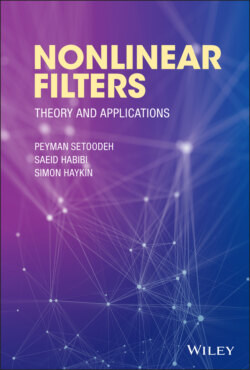Читать книгу Nonlinear Filters - Simon Haykin - Страница 35
3.3 Extended Luenberger‐Type Observer
ОглавлениеA class of nonlinear observers is designed based on observer error linearization. State estimation by such observers involves multiplication of a matrix gain by the difference between predicted and measured outputs. After designing the observer (selecting the observer gain), this calculation can be performed fairly quickly, which is an advantage from the computational complexity perspective. However, the domain of applicability of such observers may be restricted to a specific class of nonlinear systems. A discrete‐time nonlinear Luenberger‐type observer has been proposed in [36]. A deterministic discrete‐time nonlinear system is described by the following state‐space model:
(3.6)
(3.7)
where and are nonlinear vector functions. At time instant , let denote the sequence of the past inputs:
(3.8)
where is the dimension of the state vector. Given an initial state and a sequence of previous inputs, a series of predicted outputs can be generated using the state equation (3.6) as:
(3.9)
Let denote the th composite of the system function as:
(3.10)
Given an initial state and the sequence , the corresponding sequence of predicted outputs is obtained as:
(3.11)
To simplify the notation, let us define such that
(3.12)
then we have:
Defining
(3.13)
the filtered state estimate is computed from the following discrete‐time system [9]:
(3.14)
(3.15)
where is the observer gain, , and is the discrete nonlinear observability matrix, which is computed at sample time as:
(3.16)
The observer gain is determined in a way to guarantee local stability of the perturbed linear system for the reconstruction error in :
(3.17)
where and
This approach for designing nonlinear observers is applicable to systems that are observable for every bounded input, , with and being uniformly Lipschitz continuous functions of the state:
(3.18)
(3.19)
where and denote the corresponding Lipschitz constants. However, convergence is guaranteed only for a neighborhood around the true state [36].
